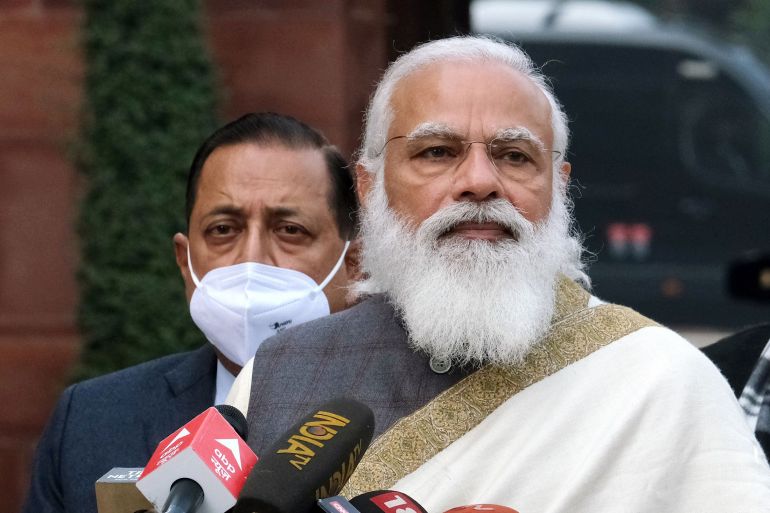Indian opposition says Modi used Israeli spyware on rival Gandhi
India’s Prime Minister Narendra Modi is accused of targeting his rival Rahul Gandhi using NSO Group Ltd’s Pegasus spyware.

Prime Minister Narendra Modi’s government targeted his political rival Rahul Gandhi for surveillance using Israeli company NSO Group Ltd.’s Pegasus spyware, according to India’s largest opposition party.
Phones belonging to Gandhi and India’s chief election commissioner, Ashok Lavasa, were identified as potential targets using the spyware in the lead up to the 2019 general polls, the Indian National Congress alleged. It cited media investigations into a leaked list of potential targets of NSO, whose spying tool Pegasus allows clients to infiltrate phones and monitor text messages, camera feeds and microphones.
Keep reading
list of 4 itemsWhatsApp blocks 2 million India users over ‘spam message abuses’
India’s internet law adds to fears over online speech, privacy
India sees 2,000 COVID deaths as Modi warns against overcrowding
“Is spying on India’s security forces, judiciary, cabinet ministers, opposition leaders including Rahul Gandhi, journalists and other activities through a foreign entity’s spyware not treason and an inexcusable dismantling of national security?” Congress spokesman Randeep Surjewala said at a press conference in New Delhi.
Surjewala raised questions about whether Modi or Home Minister Amit Shah had contracted NSO and how much money had been spent on the spyware. Congress has also called for Shah to be removed and an inquiry into the allegations.
The Prime Minister’s Office did not immediately respond to calls or emails seeking comment, however his government addressed the issue in a media conference held to refute the Congress claims. There was “not a shred of evidence” in the Pegasus story that shows links to the government or the ruling party, spokesman and former technology minister Ravi Shankar Prasad said. “If more than 45 nations are using Pegasus, why is only India being targeted?”
‘Not Possible’
The nation’s newly-appointed technology minister Ashwini Vaishnaw, whose phone was among those listed as compromised in a Washington Post report, also denied any surveillance attempts by the government.
“Let us look at India’s established protocols when it comes to surveillance,” Vaishnaw told the parliament. “Any form of illegal surveillance is not possible with the checks and balances in our laws and robust institutions. In India there is a well-established procedure through which lawful interception of electronic communication is carried out for the purpose of national security.”
Before the 2019 elections, Modi’s government denied allegations carried in local news outlets that it had purchased the Pegasus spyware that was then allegedly used to hack over 1,400 phones, including those of several Indian lawyers, journalists and activists. At the time, Facebook Inc., parent of WhatsApp, informed users that malware had been sent on their devices, according to a company statement. Facebook sued NSO, alleging the company hacked into users’ mobile phones.
This latest investigation by the Paris-based not-for-profit Forbidden Stories, including digital forensic analysis by Amnesty International’s security lab, was shared with a media consortium that includes the Washington Post and other outlets.
Among the findings is that the spyware was used to target the smartphones of both the wife and the fiancee of murdered Saudi columnist Jamal Khashoggi. Their phone numbers appeared on a list of more than 50,000 numbers, which the consortium said were possible targets for surveillance by governments using Pegasus.
Also on the list are phone numbers of overseas journalists for news organizations, including CNN, the Associated Press, Voice of America, the New York Times, the Wall Street Journal, Bloomberg News, Le Monde in France, the Financial Times and Al Jazeera in Qatar.